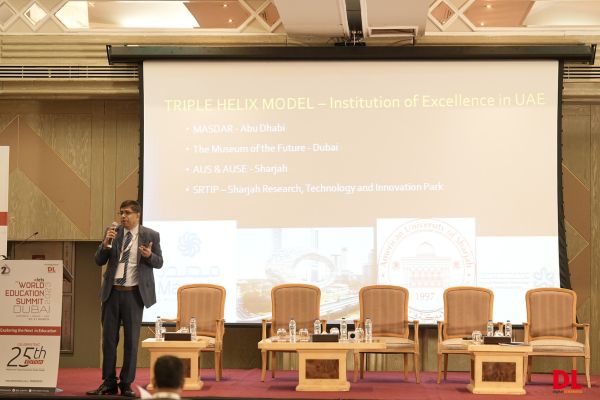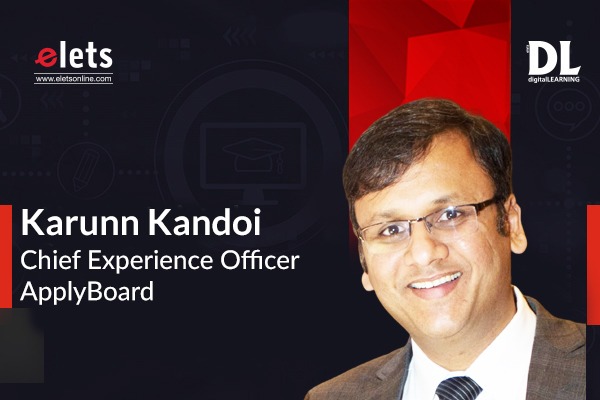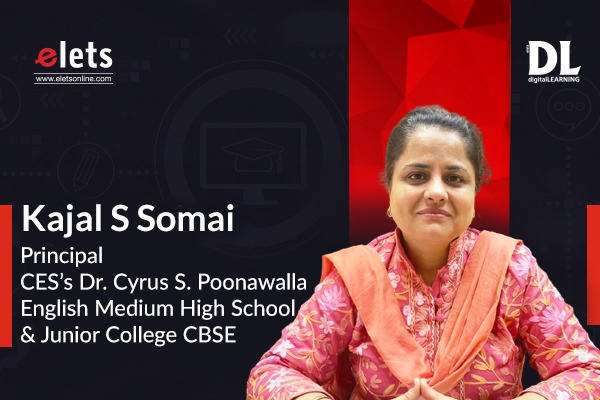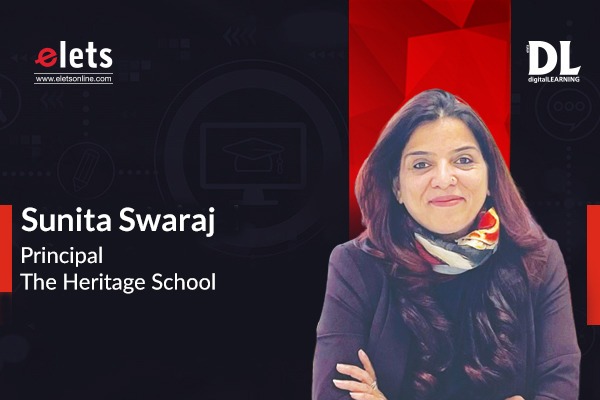In a Fast Changing and interdependent world, Education must go beyond Academic and cognitive knowledge, learning beyond classrooms will add impetus to reach our full potential as human beings, shared Nikhil Wagh, Chairman, Educon International School in an exclusive conversation with Sheeba Chauhan of Elets News Network. Edited excerpts:
What are your thoughts on the usage of AI tools like chatGPT , Bard etc for creating content and various other uses? Do you think it will hamper the quality of education in the long run?
Technology can be leveraged for unleashing student potential, Integration of technologies can add impetus in creating innovative learning environments. New and emerging technologies are provoking re-conceptualization of Teaching Learning processes while also serving as catalyst for transformation and innovation. The Curriculum framework is one of the essential conditions necessary to effectively leverage technology. Technology is best able to enhance learning when educators use it intentionally interweaving tech tools that match the desired learning outcomes.
It is vital that tech is deployed to complement the learning taking place in the classroom both in regard to textbooks and personal development.
Technology provides specific and alternate learning experiences to the learner and engages them in their own learning bringing richer deeper new learning experiences. Technology is not a prerequisite for deep learning, Tech is just a vehicle but it is a powerful one.
As vehicle tech can not only act as a lever for systemic change in the design of learning environment, but it also impacts T&L at the micro level by creating powerful different learning experiences, therefore the content that is delivered via this vehicle is immensely important. Also known as Digital Learning Resources (DLR), content materials such as simulations, animations, AI, VR, and digital textbooks have made incredible strides in the last several years.
DLRs fall in an intersection between tech pedagogy and must be explored, developed and studied in a voracious way in order to fully realize the potential of digital tech for the very individualized cognitive act of learning. In simplest terms , we live in a digital world, many of our students are connected majority of time and education has not yet caught up, this raises many questions, concerns and unknowns, education should have the responsibility to equip young people with the necessary skills and values that will allow them to cope with challenges that globalized world is posing to them.
The imperative for discussion and exploration around key issues such as learning diversity, digital literacy, the new digital divide, the blurring boundaries between formal and informal learning, and the use of technology for monitoring and assessing learning must take priority in our work to recalibrate and engage our learners on a journey of creating digital tech-rich learning environments which will value add and enhance the quality of education.
There will be a significant impact of AI tools like Chat GPT on school education. It would make it easier for students to cheat and plagiarise on projects and homework. We can beat the same up to some extent with the help of technology itself. i.e., by using plagiarism detection software or other tools to determine if something was written by a human or an AI. Such tools can look for the absence of personal experiences or emotions, check for inconsistency in writing style, and watch for the use of filler words or repetitive phrases. These are generally the signs that the text generated by an AI. However, many other aspects of homework will depend on the sincerity of the students. Tweaking, modifying the traditional evaluation pattern, and incorporating the assessment techniques to gauge students on skills, creativity and knowledge would be the answer to prevent the misuse of AI tools.
Union Budget 2023 focussed on revamping teacher training. How do you support the move and what are your plans for implementing training at your school?
“The NEP 2020 emphasizes adopting a pragmatic approach of redesigning comprehensive curriculum policy aimed to achieve holistic development by integrating Experiential and Project-based learning which adds impetus and strengthens. Conceptual Learning enables a better understanding of a concept and moves away from a rote method of memorization promoting critical, computational thinking and problem-solving skills”, said Nikhil Wagh.
Flexible assessment criteria to analyze and measure learning outcomes met at the end of each development stage, VAK theory approach of addressing different learning styles encouraging and rewarding innovative T/L pedagogies. The whole approach of education should be student-centric and enable each and every student to be a Successful Learner, Confident Individual, Responsible Citizen, and an Effective Contributor to achieve the above aim a new paradigm of Teacher Training is the need of the hour as none of the above is possible without passionate and committed teachers, who take charge of transforming the education system as envisioned, hence teacher education requires an overhaul to understand the purpose of education, and to effectively implement the curriculum leveraging technology to engage motivate and involve the student in their own learning and address the different learning styles of an individual. Teacher education requires updation to reform K12 education. Also, service teacher training and continuous professional development of teachers are to be made mandatory. With the changing Education Ecosystem the role of a teacher is also changing from “Sage on the stage to a guide by the side”, the core role of a teacher is to facilitate learning by creating Innovative Learning Environments. Educon International School wholeheartedly welcomes the focus on revamping Teacher Training across our country,
“Every teacher needs to improve, not because they are not good enough, but because they can be even better “ – Dylan William
At Educon International School, they believe “Teachers Make the Difference”. EIS encourages the professional development of teachers, hence organizing workshops to enhance their teacher’s skills is an incredible part of the school. They strongly believe that CPD (continuous professional development) has the potential to raise the bar and close the gap in pupil attainment. Hence, CPD workshops are regularly organized to keep their teachers updated to the latest trends in teaching pedagogies. They are often delivered by renowned International Facilitators. They hope to provide both support and challenge to their staff as they do in our curriculum; strive for personalization in the CPD programs. All staff has collaborative planning sessions where their core purpose is of enhancing the learning & teaching process. So in short, our CPD is effective for staff development as it is increasingly targeted to build on existing teacher skills and is based not only on what we think effective teaching looks like, but on its impact on student’s learning and collaboration.
Education Minister launched The Yuva Sangam portal which will concentrate on organizing youth-exposure tours for students from North Eastern States to other states and vice versa. How do you think such initiatives are going to develop multicultural education in Indian students?
Education should prepare students for life and active participation in a global multicultural society by developing in their knowledge and understanding of the world while retaining traditional Indian Values.
India is the most ethnically diverse country in the world, there is a great diversity in our manners, habits, tastes and customs, traditions, culture, regional languages, etc working on joint curriculum projects encouraging students to exchange program with partner schools will give students an opportunity to appreciate and value diversity of cultures within our country.
Programs like exposure tours will give an opportunity to young people to interact with their counterparts across various states within India. These Project-based Learning avenues will give them a first-hand experience to appreciate, celebrate and value different cultures within the country and also make them aware of domestic issues and the impact of globalization on various strata of our society and equips them with skill and knowledge to be an Active Global Citizen.
In a fast changing and interdependent world, education must go beyond academic and cognitive knowledge, learning beyond classrooms will add impetus to reach our full potential as human beings.
We are in need of an education that teaches us to be and live together embracing universal values, equal rights and social justice, respect for cultural diversity, international solidarity and share responsibilities and programs like Yuva Sangam will be instrumental in supplementing this cause.
Connecting India is an ambitious project undertaken by EIS through which we seek to partner with schools across our country so as to provide a platform for students to interact and share their culture traditional language, to discuss, deliberate and debate on issues concerning our nation.
According to the economic survey 2022-23, enrollment at the pre-primary level decreased from 1.1 crores in 2021 to 1.0 crores in 2022. Your comments on the same.
Historically EECE in India has remained relatively neglected. Early Childhood care and education (ECCE) is considered a precursor to school education.
The term ECCE also known as preschool or pre-primary education traditionally refers to the education of children aged 3 to 6 years. In India, the current condition of education for this age group lies at two extremes one in urban areas and the other in rural areas, wherein awareness and importance as well as recognition is quintessential challenge and exacerbates inequality.
The preschool years play a significant role in preparing children for the school education ahead. An effective ECCE contributes to enrolment, help reduces dropout in early years, and helps children acquire foundational literacy and numeracy in early years.
NEP 2020 has envisaged an expansion of early childhood education institutions with particular emphasis on the inclusion of economically weaker sections. In the new structure under the NEP for the first time, early childhood care and education have been considered from age 3 onwards.
NCERT would develop a national curriculum and pedagogical framework for ECCE including a guide for parents and institution, the planning and implementation of EECE will need to be carried out jointly by the Ministry of Women and Child Development, Education, Health and Family Welfare.
Awareness and Importance of ECCE have to be propagated amongst parents across all strata of our society, our education ecosystem should recognize ECCE as a fundamental right for children 3-6 years. Though maximum cognitive development happens between 0-6 years the much-required recognition of ECCE which was due for a long time looks to be insight, with the concept of Universalization of preschool education enrolment will go up in years to come.
Schools at all levels showed an improvement in their gross enrolment ratios (GER) for fiscl year 2021-22 , do you think the mere improvement in GER will enhance the quality of education?
The success of a Nation Depends upon the education of its people, education has to be at the core of the National development agenda. School Education is perhaps the most important basic element of the education system as it lays a strong foundation for further learning. The need for quality education with a value system leading to productive employment and hence comprehensive qualitative development of the nation is the need of the hour. Quality of education is characterized by the creation of the capacity of lifelong learning and educators contribute a lion’s share in this. The improvement in GER is a positive sign that we as a country are reaching out to the masses and now we need to step up the quality of education imparted.
There are 3 basic elements of quality in education; Management quality, teacher quality, and student quality. The students gaining entry at primary levels are fresh in mind, open and amenable. It is therefore left to the Management and teacher to create capacity for learning at that stage through the quality instructional and support processes integrated into curriculum. The school Management has to conceptualize the overall curriculum according to local needs covering syllabus, pedagogy, co-curricular activities, mentoring, and evaluation
Quality of education will be enhanced by adopting a pragmatic approach towards education aiming at the holistic well-being of all learners. The increase in GER will encourage a new Paradigm of education in our country.


























